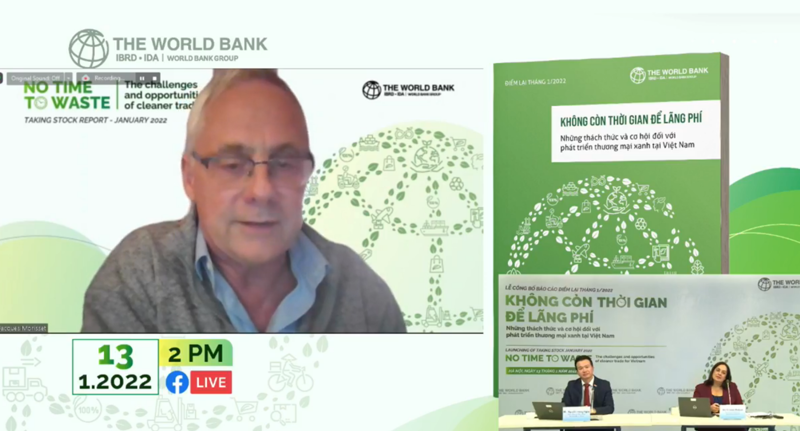Vietnam needs to promote the development of green trade in order to meet international requirements, World Bank (WB) analysts told the online release of the January 2022 edition of the Taking Stock report, entitled “NO TIME TO WASTE: The challenges and opportunities of cleaner trade for Vietnam”, on January 13.
Vietnam should give greater priority to green trade because it can help reduce the environmental footprint of trade industries. In turn, these reductions will contribute to the implementation of a green, resilient, and inclusive development approach and help Vietnam reach its national mitigation objectives.
Green trade will spur existing industries to retool to green technology and remain competitive in a low-carbon future. It can also offer new opportunities for trade in environmental goods and services and opportunities are expected to be a potential driver of new jobs as existing industries retool and businesses take advantage of new environmental goods and services.
Even though Vietnam has taken measures to reduce carbon in production over past years, there is higher demand for green products from many multinational companies as well as in markets all around the world. “Vietnam, therefore, needs to develop industrial parks that produce green products in a more sustainable way as well as strengthen incentives for investment in green services to promote the greening of trade,” said Mr. Dorsati Madani, Senior Economist at WB Vietnam.
According to Mr. Jacques Morisset, Chief Economist at WB Vietnam, pressure from the international market is increasingly placing high demands on the greening of trade in Vietnam. Specifically, Europe and the US, which are Vietnam’s main export markets, have requested the application of the Carbon Border Adjustment Mechanism (CBAM) to encourage enterprises to apply clean technologies in production.
Many multinational companies in Vietnam are also gradually changing their behavior towards green trade, such as Apple, Nike, and others, and have committed to building a green supply chain. “Eighty per cent of Vietnam’s total exports to other countries come from these multinational companies,” Mr. Morisset said. “Therefore, Vietnam will need to adjust its green trade policies if it wants to retain these businesses and attract new businesses.”
In order to promote the greening of trade, Vietnam needs to apply carbon taxes on products before they are exported and strengthen domestic regulations on businesses that export. Simplifying procedures in producing green products and environmentally-friendly products is also needed.
In addition, the country should promote the development of eco-industrial parks and encourage FDI attraction in green fields. Authorities could encourage multinational companies in Vietnam to transfer green technology to suppliers and other businesses. It is also important to promote support for new startups and businesses that export green products in finance and infrastructure, and take full advantage of the opportunities from the EUVFTA and the CPTPP.









 Google translate
Google translate